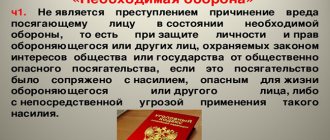Corpus delicti
The objective side of the crime includes the use of violence (dangerous or not dangerous to human life or health), as well as the threat of its use.
The content of the threat is not specified by law, but may include a threat to kill, cause bodily harm, or destroy property of citizens. Moreover, all these actions constitute a crime only if they were committed while the official was performing his immediate duties. If violence or its threat took place due to the latter’s violation of the norms of the legislation of the Russian Federation, then there will no longer be a crime.
The subjective side includes the form of guilt in the form of direct intent. Its mandatory features are determined by:
- the purpose of the offense is to prevent an official from performing his immediate duties;
- the motive is revenge for their fulfillment.
The subject of the offense is a person who has reached 16 years of age. Teenagers from 14 to 16 years old, whose guilt in such a crime has been proven, are liable under Articles 111 and 112 of the Criminal Code of the Russian Federation.
The object of the crime is the life and health of an official in the performance of his official duties.
The crime will be considered completed if the use of physical or psychological violence has begun.
Separately, we note that in cases where the use of violence against a police officer was carried out with torture, the crime will be qualified in its entirety under Part 2 of Article 318 and Part 3 of Article 111 of the Criminal Code of the Russian Federation.
What is the article for assaulting a police officer?
An attack on a law enforcement officer is regarded as a deliberate act that cannot be an accident. The motive for such a crime is most often revenge for legal activities - conviction, prosecution under a certain article, detention, etc.
The injured party is a person in execution or his family, for the use of violence, in respect of whom liability is provided under the following articles:
- Art. 318 of the Criminal Code of the Russian Federation - attack, beating and other forms of violence or attempt to commit violence;
- Art. 317 of the Criminal Code of the Russian Federation - attempted murder of a policeman, military personnel or their loved ones;
- item b part 2 art. 105 of the Criminal Code of the Russian Federation - murder.
Note!
If the injured party is not a government agency, but a police officer as an individual, then reconciliation of the parties is possible, which allows one to avoid deprivation of liberty when an agreement is reached between the participants in the incident.
Even just hitting a police officer, the guilty person will be punished starting at 16 years. If murder is committed, then responsibility begins from the age of 14.
Do you have any questions?
To get the most detailed advice on your issue, you just need to follow any of the suggested options:
- Request a consultation using the form
on our website - Or just call the number: 8 800 350-83-74
Investigation and proof of guilt
When investigating such crimes, it is extremely important whether the official was in the performance of his duties or not . This means that a police officer or government official must be in uniform and with identification during his work shift. Also, his actions must remain within the framework of the legislation of the Russian Federation.
To admit guilt, evidence will be required that the official actually suffered any bodily harm. A medical examination is required, as a result of which the citizen must be provided with a certificate of his state of health.
If threats were used against an official, evidence will be required that they were actually real and feasible. They can be either oral or written, but it is better to record them in any way - write them down using technical means, etc.
or any other objects that can be used as instruments of crime is also considered threats
What is the penalty for beating a police officer while on duty?
What a court will award for assaulting a police officer depends on the severity of the crime, the circumstances, and the totality of events. There are several punishments for encroaching on the life of an internal affairs officer and his relatives:
- imprisonment from 12 to 20 years;
- life imprisonment;
- death penalty (currently there is a moratorium).
In case of threats, fights without serious consequences for health, beatings and aggression with violence in other forms, 2 subcategories of punishment are provided.
If the attack, beating and other actions did not pose a threat to the life of the policeman and his family members, then as a punishment the court may impose:
- fine up to 200 thousand rubles;
- forced labor for up to 18 months;
- arrest for 6 months;
- imprisonment for up to 5 years.
In case of beating and assault on a police officer, resulting in danger to life, the punishment increases to imprisonment for up to 10 years.
In case of a group fight, the court takes into account aggravating circumstances, with the exception of minors. Punishment can be proportionate for each offender.
Investigation into the case of beating a police officer
The Investigative Committee of the Russian Federation is investigating the case of an attack on a police officer. The police are only collecting primary material on the case, explanatory notes, evidence, etc. The main investigative and procedural actions are assigned to employees of the RF IC.
What influences the court's decision when beating a police officer:
- mitigating circumstances - age, marital status, state of passion, etc.;
- aggravating events and circumstances - group fight, serious harm to health, drug/alcohol intoxication, preparation for the crime, conspiracy, etc.
There are a number of things to consider when charging:
- a properly constructed defense will reduce the punishment to a suspended sentence, a peace treaty or a suspended sentence;
- inflicting minor bodily harm on a police officer on vacation is not equivalent to an act under the above articles of the Criminal Code of the Russian Federation;
- if guilty, the case may be considered in a special manner, which provides for a punishment of no more than ⅔ of the maximum for the incriminated acts;
- The case can be closed at the trial stage if the parties reconcile.
Note!
When considering the beating of a police officer in a special manner, it is impossible to appeal the court decision to a higher authority.
Beating, attacking a police officer while on duty
In the event of a conflict between a civilian and a law enforcement officer, the fact that the latter is on duty will play a decisive role in classifying the opponent’s actions. With employees of operational and investigative units, the situation is more complicated than with employees with normal working hours. Carrying out the necessary activities is not always possible during “working hours”. Police officers often perform their work at odd hours, while using the powers and protection provided by law.
The Police Law gives law enforcement officers a number of rights, including the use of force. The actions of police officers are strictly regulated and should not pose a threat to the health and life of citizens. Moreover, if the situation requires emergency intervention to save a person’s life, law enforcement officers have the right to act without warning. In regular cases, according to Article 19 of the Law, a police officer during execution is obliged to:
- introduce yourself;
- put forward demands in a clear, correct form;
- give time for execution;
- notify of the possible consequences of non-compliance;
- after this it is possible to use force.
The specifics of service in law enforcement agencies require employees of the Ministry of Internal Affairs to perform duties to protect law and order not only during working hours, but, according to Article 27 of the Law, also during rest periods.
Note! If a law enforcement officer, on his way home, became an eyewitness to a crime or citizens approached him with a request for help or with a statement about a crime being committed, he does not have the right to refuse them.
During the performance of police duties, any opposition from a citizen will be regarded as an offense, and verbal or physical aggression will be considered as threats and an attack on an officer while on duty. If a citizen considers the behavior of law enforcement officers to be incorrect, and the actions and decisions to be unlawful, he should not enter into conflict. You cannot insult a law enforcement officer, touch his uniform or documents, try to hit him, or resist orders. Any of these actions will only make the situation worse. It is better to restrain yourself and remain calm, and then file a complaint against the policeman with his immediate superiors, the prosecutor's office or the court.
In the event that a police officer strictly fulfills departmental rules, actions when arresting or preventing an offense, if property was damaged or a person was injured, the security forces will not be held responsible.
If a police officer is on vacation, taking a break from duty, and the conflict situation that has arisen does not have any signs of wrongdoing, the quarrel between the law enforcement officer and other citizens will be considered as between civilians.
Note! Both parties must take into account the limits of necessary self-defense established by Article 37 of the Criminal Code of the Russian Federation. In the event of a conflict with a police officer who does not comply with departmental standards of conduct, this article gives the citizen the opportunity to avoid prosecution under articles of assault on law enforcement officers.
At the first stage, cases of attacks on law enforcement officials are dealt with by police officers, then the investigation is carried out by the Investigative Committee, an authorized body reporting directly to the President. The investigator collects information on the case: witness statements, documents, photo and video recordings. After which it qualifies the case under a certain article of the Criminal Code of the Russian Federation and transfers it to the court.
Punishment for beating, attacking a police officer
The Criminal Code of the Russian Federation provides a number of rules for offenses against police officers:
- Under Article 319, a citizen who publicly insults a police officer while on duty will be punished. Such an action is punishable by a fine of up to 40 thousand rubles or correctional labor for up to a year.
- Article 318 provides sanctions for causing bodily harm to a law enforcement officer. Punishment is determined by the severity of the injuries.
- Article 317 – attempted murder of a police officer. Encroachment on life while performing the duties of a police officer for the protection of law and order or out of revenge is punishable by imprisonment from 12 to 20 years or life imprisonment if the police officer died. The article also prescribes the death penalty, but Russia has imposed a moratorium on this type of punishment. The provisions of the article apply if family members of a police officer have suffered at the hands of criminals for the same reasons.
How is an attack assessed if a police officer attacked himself?
The Police Law gives law enforcement officers the right to use force in a number of situations. At the same time, their actions are strictly regulated and must be adequate to the situation and potential threats to the police officer himself and others. Article 19 of the relevant law requires a police officer to:
- introduce yourself;
- warn about the possible consequences of failure to comply with its requirements;
- enable the requirements to be met.
Law enforcement officers have the right to use force without warning only if delay could lead to death or other serious consequences. The use of force by police officers during an arrest should not be life-threatening. If these rules are followed, the use of force will not be considered an assault.
Note!
Article 18 of the same act, on the one hand, warns law enforcement officers about the special responsibility for exceeding their powers, on the other hand, it exempts them from charges of causing harm to property or people if they acted in accordance with the established procedure.
If a police officer unreasonably used force and the other party, in defending himself, caused damage to an official, this can be qualified under Article 37 of the Criminal Code of the Russian Federation “Necessary defense”. But it should be borne in mind that it will not be easy to prove that you are right. If the victim knows for sure that he did not show aggression and was unlawfully beaten by a police officer, he can complain about the actions of the law enforcement officer to a higher authority of the Ministry of Internal Affairs and the prosecutor's office or file a lawsuit.









